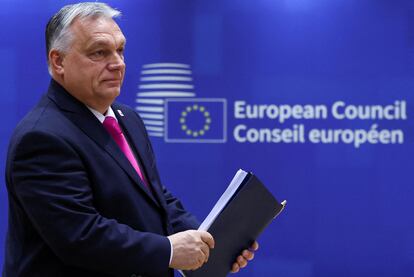European Union institutions gear up for a fight over Orbán’s rule of law record, funds for Hungary
The European Parlament tasked its legal department to prepare the groundwork for a possible challenge at the EU’s highest court

The European Union’s institutions are gearing up for a fight over Hungary and a contentious transfer of 10 billion euros (nearly $11 billion) in funds to Budapest.
The European Parliament decided to assess Thursday whether to take the bloc’s executive branch, the European Commission, to court over allegations that it gave into blackmail from Prime Minister Viktor Orbán to get his approval to start membership talks with Ukraine.
The European Parliament made the decision in a 345-104 vote and tasked its legal department to prepare the groundwork for a possible challenge at the EU’s highest court. It wants to see whether the European Commission took all measures “to protect the EU’s financial interests” in its dealings with Orbán. They said that Hungary didn’t meet the rule of law requirements to get the money.
The vote followed a bruising debate in the plenary during which legislators of major center-right and center-left groups all criticized European Commission President Ursula von der Leyen for making sure the money was approved just before Orbán unexpectedly and crucially abstained from the Ukraine vote at a summit in December.
The funds were only supposed to be released if Hungary had shown enough effort to force through some rule of law reforms on judicial independence and political interference, and during Wednesday’s plenary, von der Leyen said that the country had pushed through measures to earn the release of funds.
She said the European Commission had no option but to approve the funds and strongly denied the two issues were linked.
“These are the rules we have all agreed to,” she said. “We will follow them. This is what makes the rule of law stand out from arbitrary power.
Many parliamentarians disagreed, however.
“Once again the Parliament is having to step in,” said parliamentary rapporteur Gwendoline Delbos-Corfield of the Greens group, complaining that the European Commission and the member states “seem happy to give a carte blanche to Viktor Orbán to continue his bullying tactics and attacks on the rule of law.”
The EU is still blocking around 20 billion euros (nearly $22 billion) in funds over similar rule of law concerns, and the parliament doesn’t want to see them fall prey to political brinkmanship. On Feb. 1, EU leaders will have another summit, hoping to approve 50 billion euros (nearly $55 billion) in much-needed financial aid to Ukraine, which Orbán did block at the last summit in December.
It wasn’t the first time Orbán had derailed EU plans to provide funding to Ukraine. The nationalist leader is widely considered to be Russian President Vladimir Putin’s closest ally in the EU, and has been accused by his critics of promoting Moscow’s interests over those of his EU and NATO allies.
Orbán has advocated for an immediate end to the fighting and pushed for peace talks between Moscow and Kyiv, though he hasn’t detailed what such a step would entail for Ukraine’s territorial integrity.
Orbán has been at odds with his fellow EU leaders, top officials and legislators for years, ranging from fights over Covid-19 recovery money to his declining respect for the Western democratic principles that are the essence of the EU. Yet as the longest-serving EU leader, he knows the EU rules inside out and has been able to extract financial concessions time and again to shore up his struggling economy.
Sign up for our weekly newsletter to get more English-language news coverage from EL PAÍS USA Edition
Tu suscripción se está usando en otro dispositivo
¿Quieres añadir otro usuario a tu suscripción?
Si continúas leyendo en este dispositivo, no se podrá leer en el otro.
FlechaTu suscripción se está usando en otro dispositivo y solo puedes acceder a EL PAÍS desde un dispositivo a la vez.
Si quieres compartir tu cuenta, cambia tu suscripción a la modalidad Premium, así podrás añadir otro usuario. Cada uno accederá con su propia cuenta de email, lo que os permitirá personalizar vuestra experiencia en EL PAÍS.
¿Tienes una suscripción de empresa? Accede aquí para contratar más cuentas.
En el caso de no saber quién está usando tu cuenta, te recomendamos cambiar tu contraseña aquí.
Si decides continuar compartiendo tu cuenta, este mensaje se mostrará en tu dispositivo y en el de la otra persona que está usando tu cuenta de forma indefinida, afectando a tu experiencia de lectura. Puedes consultar aquí los términos y condiciones de la suscripción digital.








































